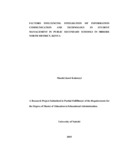| dc.description.abstract | The purpose of this study was to investigate the factors influencing the integration
of ICT in student management in public secondary. Specifically the study sought
to achieve the following objectives: To investigate the influence of technical
support on the integration of ICT in student management in secondary schools; To
assess how availability of funds influence ICT integration in student management
in secondary schools; To establish how accessibility to ICT infrastructure
influence the integration of ICT in student management in secondary schools and
to establish how the implementation of government policy influence the
integration of ICT in student management in public secondary schools.
The study employed a descriptive survey design. The target population of this
study was the 27 public schools in Kenya. The target respondents were the 27
principals and the 159 teachers and 27 technical staff from the schools. The study
utilized stratified sampling technique, from the total population of 213; a sample
of 64 representing approximately 30% of the total population was selected.
Stratification increases precision without increasing the sample size. Data
collection instruments include self administered questionnaires. Analysis started
with editing the collected information. Raw data was sorted, checked to establish
accuracy, usefulness and completeness. The data was then sorted, coded and
arranged serially to make it easy to identify. The coded data was entered in the
computer for analysis using the Statistical package for Social Sciences (SPSS)
version 17.0 computer software. Quantitative data was analyzed through
descriptive statistics using frequencies and percentages. Qualitative data was
analyzed by arranging them according to the research questions and objectives.
Data was analyzed and recorded using frequency distribution and percentages.
The study showed that majority of the schools in the District relied on ICT grants
received by schools through relevant MoE schemes that encouraged schools to
install or upgrade their ICT systems. There is inadequacy in the number of
technical support services in secondary schools in Mbeere North District and as a
result the situation has been severely limiting teachers from using technology in
student management. The study also concludes that in Mbeere North District, the
schools that have adopted ICT encounter challenges relating to equipment repair
since they have to visit the nearest IT Company for repair. This study
recommends that the ministry of education should ensure there is no delay of
funds meant for ICT implementation in secondary schools in Kenya in order to
reduce or cut the dangers associated with reliance of private funding because this
schools may be at a disadvantage and as a result contribute to an exacerbation of
the digital divide in society. Clearly, the widespread use of private funding
suggests that the demand for ICT equipment exceeds what can be met from the
public grants provided to date | en_US |

